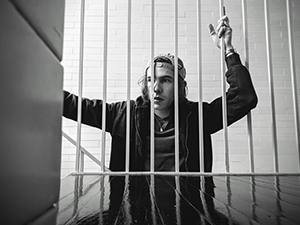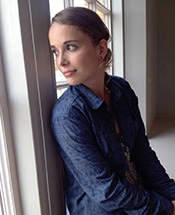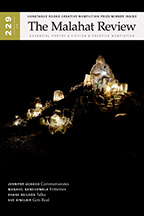Cynicism and Hope: Chloe Hogan-Weihmann in Conversation with John Elizabeth Stintzi

Malahat Review volunteer Chloe Hogan-Weihmann talks with John Elizabeth Stintzi about their 2019 Long Poem Prize-winning piece, “Cold Dying Black Wet Cold Early Thing,” which will appear in the 2019 Summer Issue #207. Read an excerpt of "Cold Dying Black Wet Cold Early Thing" here.
John Elizabeth Stintzi is a non-binary poet and novelist who was raised on a cattle farm in northwestern Ontario. Their writing has received support from The Watermill Center as well as the Canada Council for the Arts, and a selection can be found (or is forthcoming) in Black Warrior Review, The Puritan, Humber Literary Review, Ploughshares, and their poetry chapbook The Machete Tourist (knife | fork | book, 2018). They currently live in Kansas City, MO, with their partner. They can be found on Twitter @stintzi.
Read what Long Poem contest judges had to say about Stintzi's winning poem.
The season of spring is often seen as a time of warmth and renewal, but in your poem, it represents death and cold. ("Every single spring starts like this: death / after death" along with repetitions of "cold mid-May".) Can you talk a little bit about that?
Many seasons are seen from very different lights from the lights they reveal to farmers (and likely anyone whose life is tied up with the land). For nearly as long as I can remember, we have calved in the spring (transitioning from calving a few months earlier, in winter) and so spring has been long coloured-in as a season of brutality.
There is a lot of renewal, of course—and it has many advantages to winter—but there is also just as much mud and flooding and death. I think those are fairly universal, but I think one needs to be outside the city and close to the land to witness that, and so instead many of us sit in urban spaces and think of warmth and cherry blossoms and birdsong and days lengthening—all beautiful, renewing things.
Even summer, once I was old enough to start working on the farm, meant something different for me than it did to most of the kids I went to school with. It meant working—haying, especially—instead of the endless hours of freedom and possibility it meant to many of the other kids.
At the start of the poem, we perceive the father as cynical; by the end of it, he carries this almost naive hopefulness. I would love to hear your thoughts on that contrast, and how those traits can actually go hand-in-hand.
If this were fiction I’d probably get in trouble for having both be in one person, but really it’s just how my father is. He’s very cynical and pessimistic, but he’s also very unwilling to let things go, and quick to get hopeful when some action of his improves something that looks dire, even a little (because many things do not improve).
Both cynicism and hope, I think, are just different faces of the same mechanism used to cope with a desire to control what is happening. The cynicism allows him to prepare for the inevitability that he won’t be able to affect any change—that he won’t save the calf, for instance—and the hope (naive as it may seem) allows him to believe that the time he knows he will invest may not necessarily be for naught. (“Dad left it—comatose—came home, / then turned back for it.”)
In a few instances, you break the fourth wall and reference the poem within the poem. ("[I] read this poem to the calf. / Rush through all the parts about dying.") Can you tell us why you decided to use that technique?
In regards to that instance specifically—and I am almost embarrassed to say it—I really did just go into my parents’ bedroom and read the poem to the calf in the sauna. It’s not really a technique here, per se, though of course it is still breaking the fourth wall. The difference is that instead the wall is broken within the literal life I was writing about.
I wish that I knew why I did that. I think part of me felt guilty that I started writing this poem for this creature I expected was going to die while he was hogtied in a wood box under heat lamps trying very earnestly to live. I think that in reading the poem to the calf I was trying to comfort one of us, and I rushed through all the parts about dying while reading because I was ashamed of giving up on him, of being far more cynical than my dad—who had the whole farm on his shoulders while also trying desperately to save this one cold, sick, early, hopeless creature.
Can you talk about the genesis of this poem? Whether it began with a line, with a specific event, with a general sense of mood?
I’ve tipped this hand already but pretty much this poem is word-for-word what was going on at the time I was writing it. It has been some time since I wrote this poem, but I believe that it started (very predictably) with the first line—which becomes a refrain—“My dad makes jokes about the calf / dying in his sauna.” By which I mean it started when my dad tried to make light of the fact that he was doing something that was so unlikely to work, and how I knew that the jokes were his way of trying to keep the weight of his hope from crushing him.
Over the years, I have written some poems about what I was living like this. I think it has something to do with the distance from which I feel I am involved with my actual living life, and says something of the ways we perform ourselves for ourselves. (And maybe a little bit of a rebellion to Wordsworth’s “recollected in tranquility” position on poetry composition.) I don’t think that this poem is about me so much for my doing that here to be quite the same as when I’ve done it elsewhere.
Here I think it felt right to start composing the poem in medias res (alongside the events I was writing about) to map out how it would go compared to my expectations. I wanted to be proven wrong, and there were moments when I thought that I would be proven wrong, too, because as cynical as I—the speaker—am in the poem, I do have some of my dad’s wild hope, too. I want to believe we can fix things. That things can get better. And then after I started the poem, of course, the stillborn abortion happened, because death—especially at the beginning of calving—is relentless.
What's the best or most compelling book you've read recently? (I know, only tangentially relevant, but I love to talk about books.)
I’ve been going through a drought where nothing I’ve read has been very compelling (I’m in the weird phase of writing where I can’t focus on much of anything but my own work). I’ve picked up and put down a ton of books in the last six months or so—poetry, novels, stories—but the only book I’m held by is Time Is The Thing A Body Moves Through by T Fleischmann. It doesn’t come out until June 4th (I’m working on an interview with them) but it is giving me so much life. The fluid way the book moves, the confidence with which it shifts, the wrenching beauty of how Fleischmann talks about their life and their relationships to people and to art—it is just incredibly good.
One thing I’ve been working on lately is my poetry manuscript Junebat, which focuses on the year I lived in Jersey City and was extremely isolated and acutely depressed while thoroughly interrogating my gender identity, so the ways that Fleischmann talks about their own gender identity has also been hugely validating and uplifting and helpful in thinking about my own work. It’s just such a beautiful book, so I advise everyone to keep their eyes out for it (and my interview with them) in June. Another that cut through recently was Kiese Laymon’s Heavy: An American Memoir, but I expect that one should already be on everyone’s to-read list.

Chloe Hogan-Weihmann
* * * * * * * *









